My diary
Day 80 - 17th July 14
I arrive in KL in the dark and return to Reggae Mansion - although over-priced, it's familiar, safe and a short walk from the bus station. I eat noodles in China Town as the markets are closing and the stalls are being packed away. There are a few people still in the food court. The man who brings my fruit juice asks me if I am alone. I say 'yes' and he laughs and starts to serenade me: 'All by myself, don't want to be...'. I'm glad my sister's arriving tomorrow else this encounter might have left me feeling despondent.
I am about to fall asleep, when at twenty to eleven, I receive a message from Beth, asking me who my sister is flying with. The Malaysian Airline aeroplane flying from Amsterdam to Kuala Lumpur has been shot down in the Ukraine. It's with a huge sense of relief that I remember my sister was due to fly through Oman so she cannot be on this flight. I feel a deep surge of empathy for the families with relatives who have died.
Day 81 - 18th July 14
At the airport, the plane has already landed but Harry has not yet arrived at the gate. She's been hopefully awaiting her bag but it has been mistakenly sent to Hyderabad. We are leaving KL in a few hours so the lady at Oman Air promises to send it on to our guesthouse in Banda Aceh. Upon arrival, as she's in a wheelchair we are both fast tracked through immigration. The Indonesian visa is more expensive here than it was in Jakarta.
The guesthouse we have booked is in a run down building on a busy street in central Banda Aceh. One of the rooms upstairs has windows and would be ok for one night but it is not accessible for Harry. The rooms downstairs are windowless and grubby and the sheets have clearly not been changed. The communal bathroom has no shower and only a squat toilet. Harry is still feeling ill, so we apologise to the owner as we are going to stay in Hotel Oasis instead. Our room has clean white sheets, duvets, AC and a stylish bathroom.
Banda Aceh and Pulau Weh - contending with Ramadan; Scuba Diving and snorkelling in paradise
Sumatra, Indonesia
Day 80 - 17th July 14
I arrive in KL in the dark and return to Reggae Mansion - although over-priced, it's familiar, safe and a short walk from the bus station. I eat noodles in China Town as the markets are closing and the stalls are being packed away. There are a few people still in the food court. The man who brings my fruit juice asks me if I am alone. I say 'yes' and he laughs and starts to serenade me: 'All by myself, don't want to be...'. I'm glad my sister's arriving tomorrow else this encounter might have left me feeling despondent.
I am about to fall asleep, when at twenty to eleven, I receive a message from Beth, asking me who my sister is flying with. The Malaysian Airline aeroplane flying from Amsterdam to Kuala Lumpur has been shot down in the Ukraine. It's with a huge sense of relief that I remember my sister was due to fly through Oman so she cannot be on this flight. I feel a deep surge of empathy for the families with relatives who have died.
Day 81 - 18th July 14
At the airport, the plane has already landed but Harry has not yet arrived at the gate. She's been hopefully awaiting her bag but it has been mistakenly sent to Hyderabad. We are leaving KL in a few hours so the lady at Oman Air promises to send it on to our guesthouse in Banda Aceh. Upon arrival, as she's in a wheelchair we are both fast tracked through immigration. The Indonesian visa is more expensive here than it was in Jakarta.
The guesthouse we have booked is in a run down building on a busy street in central Banda Aceh. One of the rooms upstairs has windows and would be ok for one night but it is not accessible for Harry. The rooms downstairs are windowless and grubby and the sheets have clearly not been changed. The communal bathroom has no shower and only a squat toilet. Harry is still feeling ill, so we apologise to the owner as we are going to stay in Hotel Oasis instead. Our room has clean white sheets, duvets, AC and a stylish bathroom.
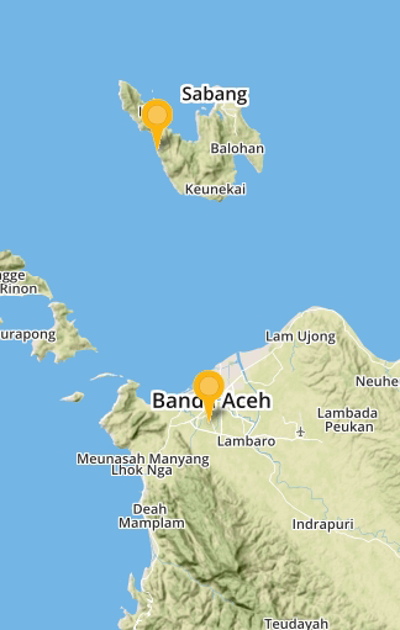
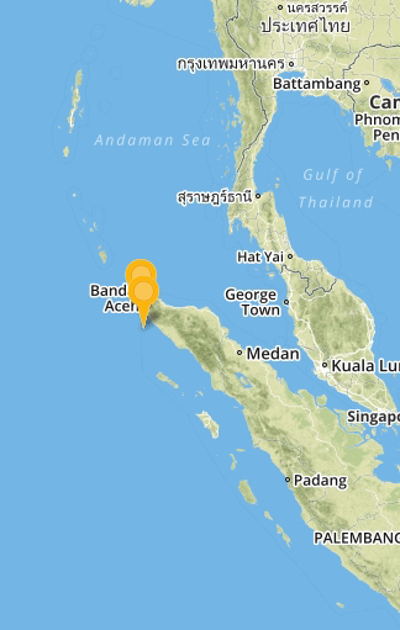
Harry falls asleep and I walk down the dusty main road to find water and food to eat. I stop at a Warung that sells Mie Goreng. They gesture for a takeaway and when I point at the table to eat here, there is much talking and confusion. It is only after the food has been placed in front of me that I realise the sun has not set and everyone in the town is still fasting. I quickly eat the food before scuttling off ashamedly. The Aceh region is under Sharia law so eating in public in the daylight hours is a big taboo, and is illegal for Muslims. Harry has asked for a snack and I spend a while trying to find a shop which is actually open. I locate a small shack that sells monkey nuts and BBQ crisps. The guys here are friendly and attempt to teach me to count to ten in Indonesian, which whiles away some time. It's dark when I stroll back to the hotel. We both get an early night.
Day 82 - 19th July 14
As we are the only foreign guests in the hotel, we are alone in the restaurant in the morning since everyone else ate Ramadan breakfast at 5. They feed us with omelette, fruit, toast and jam.
We take a taxi to the harbour where we hide in a corner to eat a few crisps whilst waiting for the boat. Local men approach us shouting aggressively so we quickly pack the food away. Harry has to clamber over one boat to reach our ferry with her crutches. A helpful local carries the wheelchair as I am loaded down with bags. When we arrive in Sabang, a girl called Putri asks to share a taxi to the beach. She's planning to stay at Iboih, and as we've not yet chosen our destination, we're happy to join her. She's from Jakarta, but has been working in Banda Aceh the past week.
The wooden stilt huts that sit along the rocky outcrop are accessed by a steep path with steps impossible for a wheelchair, so we choose a guest house in the village on the flat by the road. It looks onto the beach, but it's not possible to swim near the village without covering up in this holy period. All the restaurants in the village have closed due to Ramadan. Didi's is open for tourists at the next beach along, so we leave Harry in the street in her wheelchair to order food to takeaway. When we return, she's sitting with a group of men who are keeping her company outside a dive shop. They all speak good English, especially Bo who is married to an Australian lady who he met 20 years earlier when she was here on holiday. We eat our dinner at their table - a freshly made coconut-based Achinese fish curry.
In the evening, Harry can't sleep. Young boys read the Quran in Arabic throughout this period through a loudspeaker from the mosque located a few doors down, piercing the otherwise silent night.
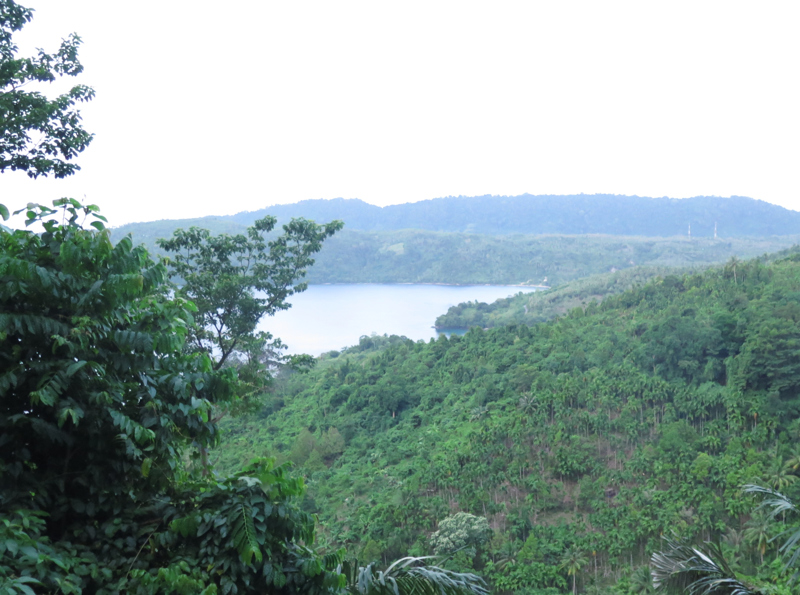
The voices are tuneless, high-pitched and whiney – hardly a sleep-inducing lullaby. I sleep through this racket obliviously.
Day 83 - 20th July 14
The cost for a half day snorkeling is 500,000 IDR, but we are in luck as a family is taking out a boat already for a special price as they are locals, so we only need to pay 100,000 IDR between us to join them.
The small beach on Rubiah island is deserted - it flaunts white sands and perfectly clear turquoise waters. The coral is bleached, no longer colourful, but the array of fishes spectacular. I pass above a black and white sea snake almost camouflaged by the sand in the shallows. A common reef octopus disappears behind a rock as I pass, like a large lump of jelly slopping into a bowl, changing its form to fit its container.
At the snorkeling spot around the island, the boatman joins us, bringing a bag of noodles to feed the fish. They swarm around us like flies. He rubs noodles onto his torso beneath his rash vest and as he swims thousands of fish follow in his wake. A decaying motorbike frame sits on the seabed and we dive down to grab its handles. The word survivor has been written beneath us, in heavy concrete slabs found on the seabed. We assume it was created in the aftermath of the Tsunami.
Putri has had to break her fast in order to snorkel today, so she joins us for lunch in the restaurant. It seems ridiculous to us, but as it's possible to inadvertently intake some saltwater, it's forbidden to snorkel when fasting. It's much easier for a female to choose to eat, as it will be assumed she is menstruating. Putri has a taxi to catch as she leaves for Jakarta in the evening, so we leave the island at 2pm.
Today there is a celebration and all the men in the village are helping to prepare a beef and durian curry, setting up tables in and just outside the mosque. We jokingly ask Bo if we can join, but this gathering is for the men only. He kindly invites us to his mother's house to eat with the females in his family instead.
We buy some biscuits and green tea as a gift, but we arrive after they have already eaten, having mistaken the appointed time. A multitude of dishes are laid out ready for us on the floor: a spicy prawn curry, salted eggs, gado gado vegetables, beef and durian curry, cuttlefish cooked in a spicy sauce, vermicelli noodles with grated carrot, vegetable soup and a sweet pink cordial filled with cucumber chunks. It's an incredible feast of tantalising flavours. We thank them profusely and repeat the Indonesian words we have been taught: ‘makan enak sikuli’ (the food is delicious). Bo's mother does not speak English, and as she's also partially blind, it's not possible to converse through the medium of mime. The wife of Bo's brother is present who speaks excellent English and we ask her whether it would be inappropriate to pay for our dinner. She tells us it would be offensive as we are guests in the house. She's an interesting woman. She used to work for the UN but gave up her job to live here in Pulau Weh after her children were born. We say goodbye content and full.
Ham, who works in the restaurant next door to our room, has offered to help us buy beer. It was his family’s snorkelling trip that we had joined on the previous day, as they were visiting from Banda Aceh. Ooh La La sits further along the dark unlit path past Didi's - a hut high up on stilts on the rocks. Travellers are here drinking and the owner hesitantly agrees to let us buy a few beers to take away. When we return, Putra, who lives next door with Ham, also joins us on our balcony. We pour the beer into mugs to look less conspicuous, as if we are drinking tea, not alcohol. Putra has an excellent grasp of the English language, but Ham has difficulty understanding any of our conversation.
After some general chit chat, he launches into a gripping story from his life a few years back. This is the story he tells: It transpires that he is originally from Banda Aceh, but had moved to Pulau Weh. At the time of the story he was a regular weed smoker and would have been in his early twenties. He and a few friends had somehow become involved with smuggling marijuana. At the time, he saw it simply as an easy way to make cash and was probably enticed by the thrill of danger. In Indonesia, there is no lesser penalty for dealing in marijuana than heroin. If caught trafficking over 1 kilogram worth of drugs, the death penalty may be imposed. He had arranged to pick up a kilo at the port in Sabang from a man travelling from the mainland on the ferry. Someone informed the police of this plan and Putra was warned in time. He fled, with a friend, across the water to the small island we snorkelled around today, visible from our balcony. They hid in the jungle beneath the torrential rain overnight. In the morning the police arrived to search for them and did not leave in the evening. It seemed that the police, realising they must be starving, were prepared to wait on the island by the restaurant until they appeared. Night fell and by now they were in desperate need of sustenance.
Seeing no other option, they decided to swim back to Pulau Weh that night in the cover of darkness. They swam across the channel in petrification, fearing boats that might be crossing their path and would not see them. They reached an empty beach a little further along the coast from the village from where they dove straight into the black jungle, cutting a path straight over the mountain. They were both naked and barefooted, blindly feeling their way through the treacherous undergrowth. Halfway through their climb, Putra realised his friend had disappeared and turned back to find him. His friend’s head had become stuck between two fiercely spiky tree trunks. Putra was forced to rip his head backwards out of this trap causing blood to trickle down his now wounded face.
From this point, they each armed themselves with mushrooms they found on the forest floor, that emanate a luminous ghostly glow in order to locate each other’s whereabouts. Before daylight they reached a village on the other side of the island. Here, a friend lived, who fed them before smuggling them out to stay with another friend who lived in a remote location in the hills. Putra stayed there for a week living only on packet noodles. He soon became ill from this lack of nutrients. He told his friends he had to leave but promised not to reveal their whereabouts if he was caught. He was somehow able to catch a ferry back to the mainland without being recognised by the police at the port. He turned up at his mother's house in a small village outside Banda Aceh, dishevelled and broken from his adventure. His mother forced him to relay the whole truth, but agreed to allow him to stay. His friend also escaped Pulau Weh a week later, enterprisingly disguised as a lady in order to reach the mainland.
He spent the first month sleeping and eating, before he was eventually thrown out of his mother’s house to make his own way. He found a job working in a factory, but he missed the island paradise of Pulau Weh. A year later, those that were caught were released from prison. A friend called him to say it was now safe for him to return. He promises us that he has not been involved in any criminal or drug related activities since. It sounds like a far-fetched story, but we have no reason not to believe it is true. Harry and I wonder how hanging around with a guy like Putra will affect our relationship with the
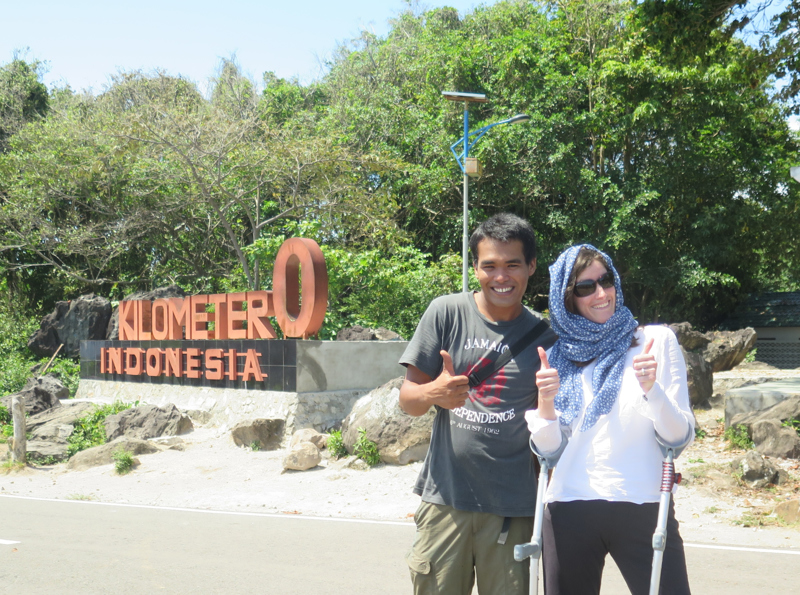
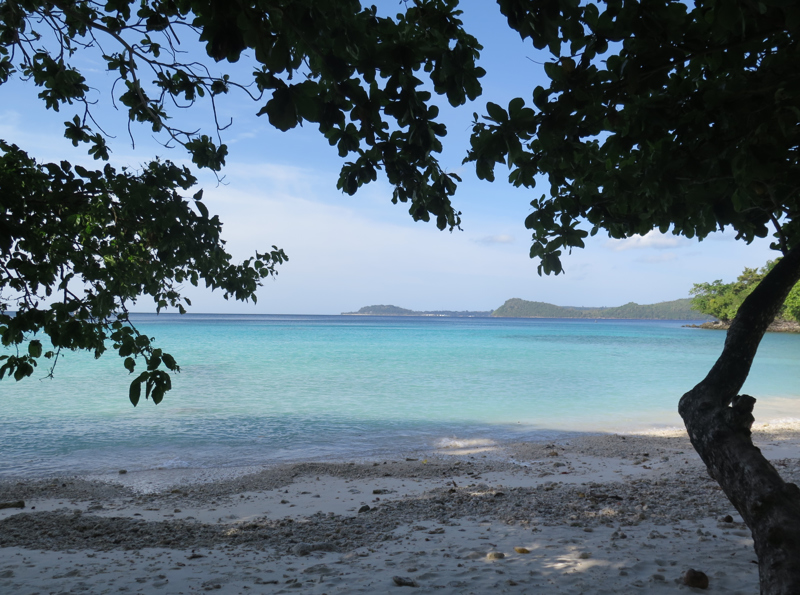
more religious-centric members of the village.
Day 84 - 21st July 14
I have booked to join a fun dive to visit a canyon at the tip of the island. Harry had hoped to snorkel but we're told the sea is far too dangerous. She's disappointed but upon reaching the dive site I understand why snorkelling is impossible. The waters are grey and choppy and the small speedboat has difficulty contending with the large waves. I have my own personal instructor as the others in the group are experienced divers. He's young, smiley and reassuringly helpful. The dive leads us down in between the steep sides of the canyon, coral flowering on its sides. We swim beneath an arch carved out of the rock. We see golden trumpet fish, morays, a cleaner shrimp, clown triggerfish, spotted box fish, glossodaris atromarginata (miniature slugs painted florescent), angel fish and schools of butterfly fish - a disco of colours like at a techno rave. A stonefish is perfectly camouflaged in its surroundings. My instructor pokes it with his metal stick and it moves away from the rock as if removing its invisibility cloak to reveal its form. A black-spotted porcupine fish, almost the length of me, floats suspended near us. The current is strong and as we finish the dive staying at 5 metres below the surface for the safety stop we drift along, with the canyon speeding past beneath us. The waves are huge and it's hard for the boat to spot us as we surface, but it
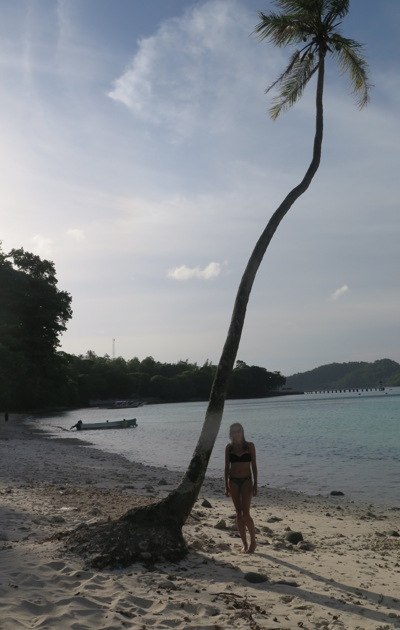
eventually locates our whereabouts. (Dive details: depth 22 metres, time 41 minutes)
We have arranged to scooter around the island with Putra in the afternoon, as I am inexperienced and not yet comfortable with carrying Harry on the back of my scooter. We drive at a slow pace and appreciate the views out to sea. The road passes beneath a canopy of trees, racing through yellow butterflies swirling in our midst. We stop at the tip of the island: a large sign announces Kilometre Zero, the most southern point of the whole of Indonesia.
We scooter next to Gapang beach for lunch. Harry eats a fresh fish with a garlicky sambal sauce. I have squid in a black kecip sauce which is sickly sweet. It's a tourist beach so you can swim here in the day. In the water our feet below us are as visible as if we're standing on land. The sun is lowering in the sky. We swim out to a fishing boat anchored just outside the bay. Putra and I heave our bodies up its side using the hanging buoys to assist. We jump from the stern to the water below before all swimming back to float on our backs in the shallows, arms-stretched; heads laid back.
That evening on our return, we meet Hanneker, a Dutch girl who is travelling alone. She's sitting with Ham outside Anis' restaurant. She's taken a sabbatical from work, most of her time spent in Africa volunteering on a couple of financial projects in Kenya and now she's travelling Indonesia for a few weeks before returning home. Ham cooks us all food. In the evening, we play cards and are taught silly matchstick tricks and agree to meet for breakfast the next morning.
Day 85 - 22nd July 14
Harry spends the morning ringing the airline and trying to locate her bag. Putra has already kindly phoned the guesthouse in Banda Aceh who has confirmed the bag has not arrived. An argument ensues as the man in KL who has sent the bag on refuses to help. The poor wifi connection doesn't assist the phone conversations as Harry is using Skype. Eventually she locates the airport number in Banda Aceh and Putra speaks to a man at the airport who thankfully confirms the bag is there. These long exchanges have frustratingly taken up the whole morning, but it’s a relief to discover the bag is not lost.
I'm scuba diving this afternoon in a location suitable for snorkelling, so the dive centre is happy for Harry and Hanneker to join us. As we're waiting in the centre, a Western guy is talking. There's gossip in the village: a guy was beaten up the previous night for sleeping with a girl out of wedlock. The Western man believes that the girl should be punished instead. He suggests she is solely to blame since she enabled the situation. He says that the man can hardly be held responsible as it’s more difficult for him to control his bodily desires after the woman has offered herself to him. I'm unimpressed by his misogynist view and begin to enter into debate with him. Fortunately this is quickly brought to an end, as the boat is ready to depart.
This dive site is called The Cave as there's a small rocky overhang, filled with coral and fishes on the sloping seabed. The current here is particularly strong. We have to grasp hold of rocks to prevent the pull from carrying us too quickly. It's an enjoyable dive. I see more of the same fishes from my previous dive. The water above is choppy and Harry is slightly exhausted after so much swimming, so she naps in the afternoon. As she tells me later, Hanneker isn't the best swimmer and it appeared she hadn't snorkelled before, so much of Harry’s time was spent coaching her.
In the late afternoon, Putra has borrowed a minibus and four of us drive into Sabang to buy food for our planned BBQ this evening. At the fish stall Hanneker and I hide in the van so Ham and Putra have a better chance at bargaining. For a huge tuna fish we pay only 55,000 IDR! The vegetable market is all but closed except for one stall, where we buy tomatoes, cucumbers, carrots, potatoes, aubergine, garlic, shallots ginger and chillis. We buy sauces for cooking and fruit for desert. Back in the village, we sit outside the restaurant peeling and chopping the vegetables. Vanessa, a girl from Paris who Hanneker had met the previous day, joins us. The fish is already scaled and gutted. Putra fills it with the finely chopped ginger, garlic and chilli, before wrapping it in banana leaves that he collects from the tree around the back of the building. The vegetables are steamed with oregano ready to eat and the aubergine slices fried. We wake Harry and drive to Gapang beach. We utilise a wooden table with roughly cut benches, which is already set up on the sand, lighting candles sitting in plastic bottles filled with sand which holds them in position.
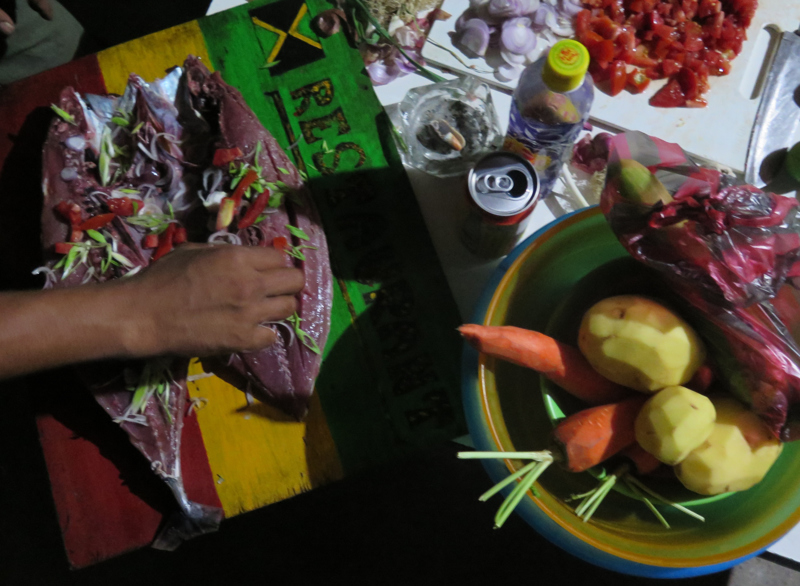
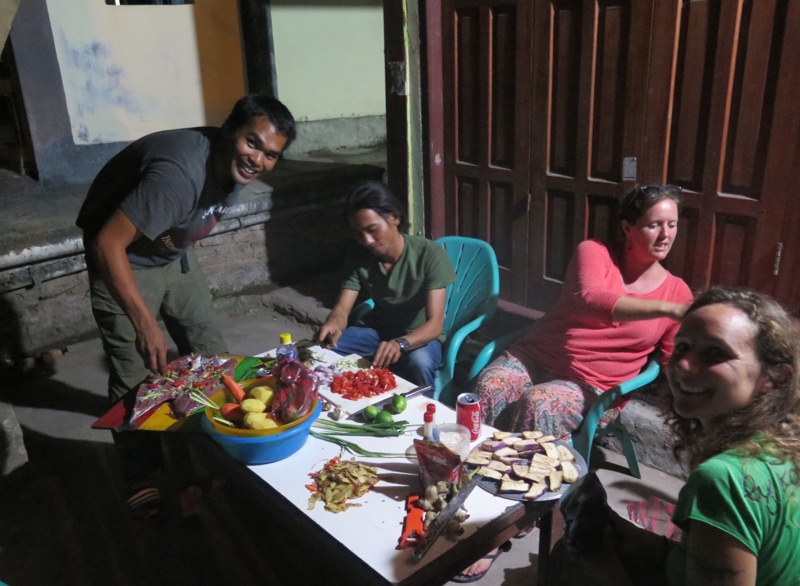
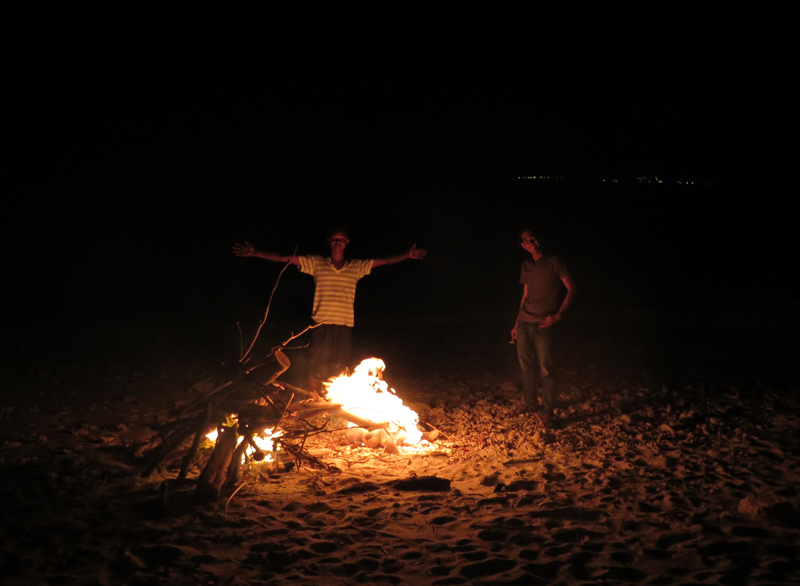
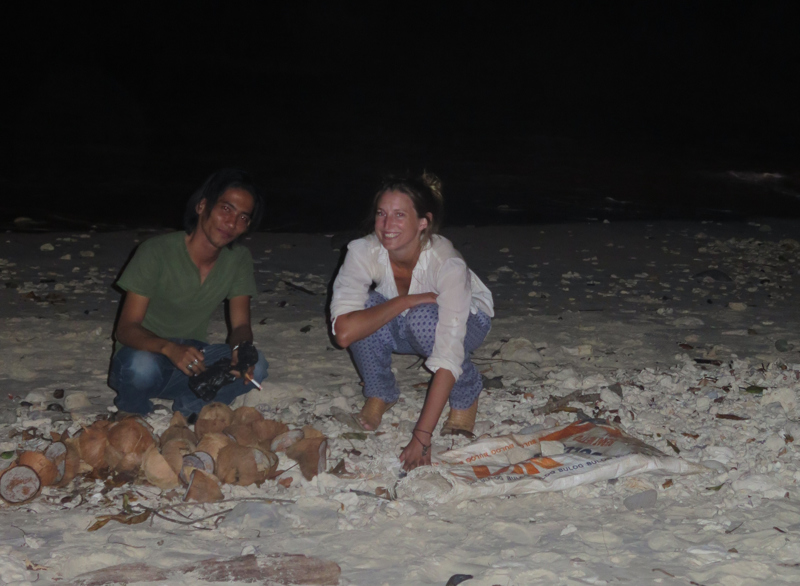
The guys collect firewood for a bonfire, and create a barbecue using dried coconut shells, which burn slowly like coal. Ham uses a piece of plastic bag for kindling to help set the shells alight. We lazily sit back and watch. The fish is fresh and meaty; the crunchy vegetables still warm, flavoured with herbs. A couple of guys come and join us after the meal while we sit and relax. One of them is an ex-pat from Spain. He and a couple of friends have set up a diving centre here. Everything about the evening is perfect - a magical moment in time.
Day 86 - 23rd July 14
The dive site has agreed to take me on a sunrise dive, despite being their only customer. I'm such a deep sleeper it feels impossible to wake but I tug my eyes open and pull myself out of my coma. It's 5.45 am and the village is perfectly asleep. The dive centre is still closed so I wait on the bench outside, hoping someone will turn up. There's little movement in the village except for one man that scooters by. This is my last opportunity to dive, so I don't want to leave in the hope someone will appear. The sun is already rising and a scooter screeches up at 6.30 am. More's alarm did not wake him and he apologises for being so late - he seems to be in not the best mood. I haven't had him as an instructor before. When we reach the site, he is worried the current is too strong, but it's the best place to dive with the sunrise and he makes a snap decision. We must go down very quickly to reach the bottom where the current will not be so severe. Happily my ears are able to equalise when dropping at this speed. We reach the bottom and Mores uses underwater sign language but I don’t understand his instructions. We stay crouching against a rock looking upwards and around. Dazzling sunlight filters through the surface far above, as thousands of fishes swirl upwards taken by the current - a truly bewitching sight. Lion fish lurk on the slanting rock face. Two moray eels share a crevice, both screaming soundlessly as if imprisoned by the rock. The current is dangerous in places and my instructor grabs hold of my jacket so as not to lose me. As we bubble up to the surface and fill our BCDs with air, he shouts at me 'You know nothing. This is the sign for a current.' as he presses his fingers together creating a v-shape with his hand. His bad mood removes some of the magic from the morning's spectacular underwater scenery. We speed back in silence in the early morning light. He has softened when we return to the dive and I explain I completed my open water 2 years ago in Kao Phi Phi, where the sea was calm and so the theory regarding currents and riptides was never put into practice. Arriving back at 9, everyone is up and eating breakfast. I join them before going back to nap while they prepare vegetables for a picnic that day.
We have hired a boat for the afternoon and the 5 of us spend the day snorkelling. We eat lunch on the beach in the shade on Rubiah
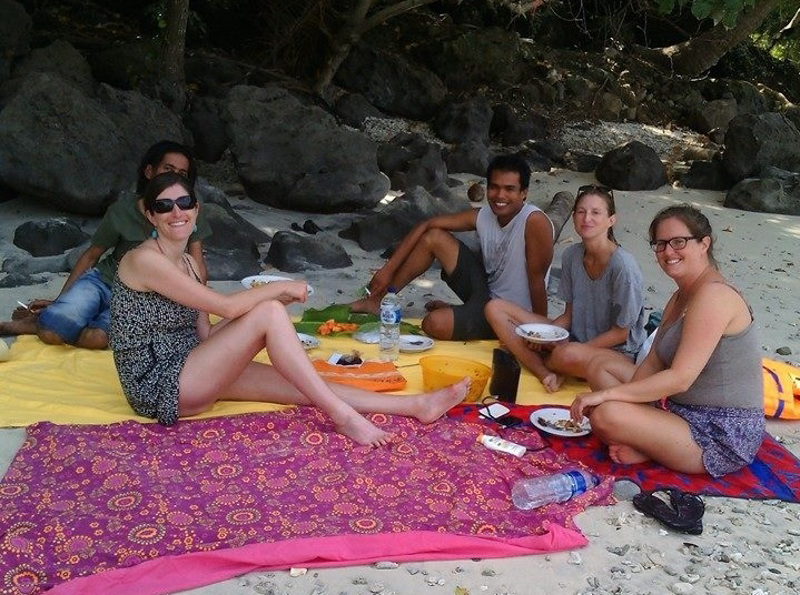
Island. Blankets are laid on the sand, and plates and cutlery provided for a classy picnic. We feast on the vegetables mixed with chunks of tuna remaining from the previous evening and cut up papaya laid out on a banana leaf. A small group of Chinese tourists who arrive on a boat snap away like paparazzi photographing our white skin. While snorkelling, I locate an underwater camera dropped amongst the rocks and dive down to fetch it. It belongs to one of their group, but I was half hoping it wouldn't be claimed.
From here, we take the boat to Gapang beach. Large white clouds sail leisurely past in the blue sky: a whale, a pig, a lionfish drift in and out of shape. We nap in the late afternoon on a strip of beach that still remains in the sunshine, before buying some beers which we share with the drivers. They are impatient to get back, so we say goodbye as we can find transport for the road. We have to borrow money from
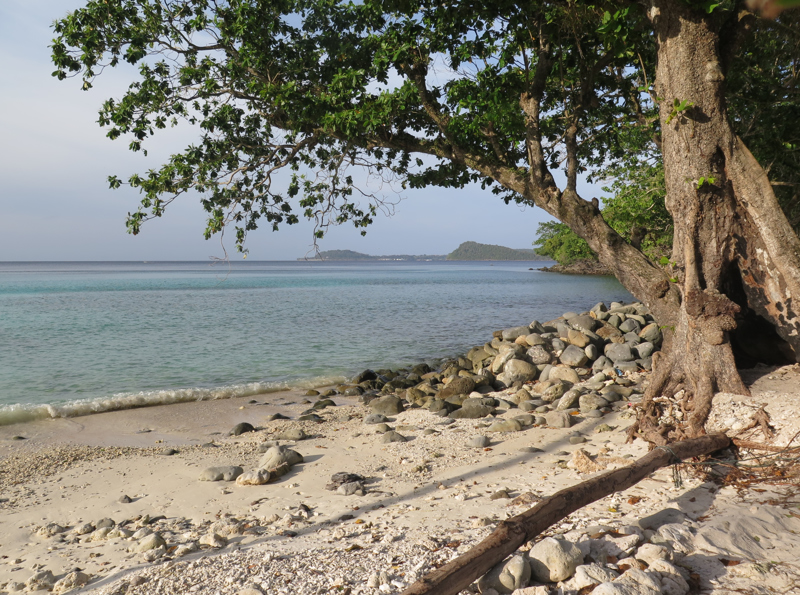
Putra to eat at the restaurant. We share a huge white fish cooked to perfection and cap cai with mushrooms. Sergei, the Spanish guy from the previous evening, is going to a party up the hill and we ask if we can join.
The path up the hill is steep and inaccessible with a motorbike, but Harry's determined to try crutching up. The house on the hill is alit with stars. Someone is playing the guitar and singing. No one is particularly talkative so we lie on the grass in a mellow mood. The guy playing the guitar grew up inj Jakarta. He came here a few years ago and has never left as he delights in the chilled out vibe of island life. He has still retained the same job, but is able to work from his new home in Pulau Weh. AJ, an Iranian who has also helped set up the dive centre Monster Dive, lives in this house and is friendly and welcoming. Putra tells us the house is actually owned by his friend who is now living in Germany. Putra helped him to build it and lived here for a while, so the place evokes nostalgic memories. A French girl lies sleeping on the grass, her hair tied with a patterned hippy scarf, her head propped up at an awkward angle against a chair. As the other guests are leaving we follow suit and thank them for their hospitality. Putra rings a friend with a van who picks us up to take us home. We arrange for him to drop us at the ferry terminal in the morning. As we arrive back to our room we decide instead to catch the afternoon ferry, as an early start is unappealing.
Day 87 - 24th July 14
When we have finished packing, we have a little time to chill out. I ask Putra for more information regarding the village gossip. He explains that the woman's husband was from France, but he left her a few years ago. He says she was heartbroken. She has been having an affair indiscreetly with an Indonesian guy who lives on Gapang beach. He is in love with her and she is lonely. A relationship out of wedlock is illegal under Sharia Law. The men of the village intervened, forbidding him to visit her in her house when she was alone. He ignored this order, continuing their affair. Two evenings ago, when he was visiting, the men gathered and went together to ask him to leave, threatening to call the Sharia Police if he did not comply. He refused telling them he was there of his own free will. Putra does not know who instigated the violence, but the outcome of the evening was that he was punched twice in the face. Since then, they have agreed to marry, but Putra tells us her eleven year old son is currently in France and he will be very unhappy on his return to find his mother with a new husband without consulting him. The reality may be that the villagers were actually attempting to protect them both. The law authorises punishment including up to 100 lashes for adultery by unmarried persons and death by stoning for adultery by a married person.
I am shocked by this extremism that resides in Aceh. The Aceh region differs from the rest of Indonesia, being the only area that is ruled by Sharia Law. We understand it has always been religiously conservative and is believed to be the area where the spread of Islam in Indonesia began. Prior to the tsunami, civil unrest had reigned; the people were fighting for their independence from Indonesia. When Aceh was devastated by the tsunami, it was suddenly completely dependent on the Indonesian government, in dire need of assistance, which brought the civil war to an abrupt halt. We understand that Sharia Law was imposed on the community as a ‘present’ from the Indonesian government. For the younger generation, this is less a gift, but a penalty against their freedom. Putra has already shared a story with Harry and me, while sitting looking over the jungle to the sea on a wall by the road. He had been in the same romantic spot with a Western girl a few years back, innocently holding her hand, when the police turned up and threatened to take him to jail for this inappropriate behaviour. It was only due to having friends in the right places, and his involvement in tourism, that he was able to prevent them from carrying out this threat.
Harry and I would prefer to travel back to the harbour on a scooter, so Putra manages to arrange something. Her wheelchair is strapped onto the side carriage of a scooter which she sits in while Hanneker, who wants to visit the market in Sabang, sits on the back of the scooter. I want to try driving, so Putra agrees to sit behind me so he can return the scooter to Iboih. It's an hour drive and requires much concentration, a few places in the road steep with sharp curves. The high road to Sabang is wide and fast and we speed the remaining distance to the harbour, arriving safely and exhilarated.
We've arranged with Fikri to pick us up from the harbour to transport us first to the airport and then the Tsunami museum if there is time, but we foolishly don't agree on a price. A man, also named Putra, picks us up from the port. He plays loud music - a house DJ spinning popular tracks. Harry raves with her arms in the front seat and he joins her, laughing. At the airport I ask for the lost baggage section from a number of people, eventually locating the office in arrivals. They have Harry's bag and she is thrilled to receive it.
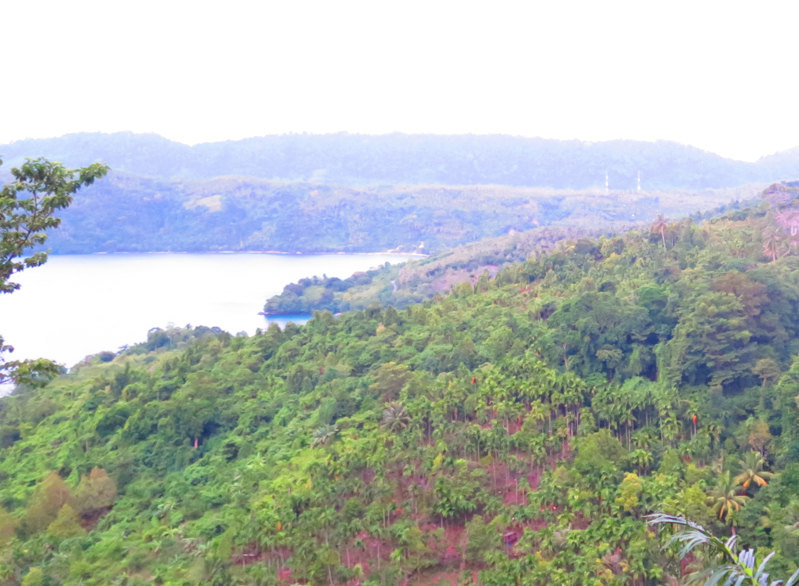
The Tsunami museum is in an impressive modern building, oval shaped, its walls covered in a layered diamond patterned structure in grey over white like netting, bearing a very slight resemblance to the much larger Birds Nest in Beijing. It's closed upon arrival but we beg the man coming out of a side door to allow us to look around. I wheel Harry down the path inside, walls towering high on both sides. The electricity has already been turned off, but normally water would cascade down the walls creating a dramatic imitation of the 20 metre tsunami wave that mutilated the city. A room houses aerial photographs of Banda Aceh before and after the disaster. It was the worst hit area and one picture shows only the impressive mosque remaining, which the people took as a religious sign of the importance of their faith. Numerous charities were involved in the project to rebuild the city, some of which were unsuccessful. Houses constructed quickly, fell apart quickly, whereas those who had to wait longer were provided with solid functioning houses. A village named after Jackie Chan stands empty, a ghost town in an area which nobody wanted to live. It's a depressing visit. The museum itself has become a bit of a white elephant as the city is hardly a tourist destination, people rarely stopping on their way to Pulau Weh.
We expect to be returned to the guesthouse, but Putra instead gives us a tour of the city unrequested. A huge cargo ship sits in a car park,
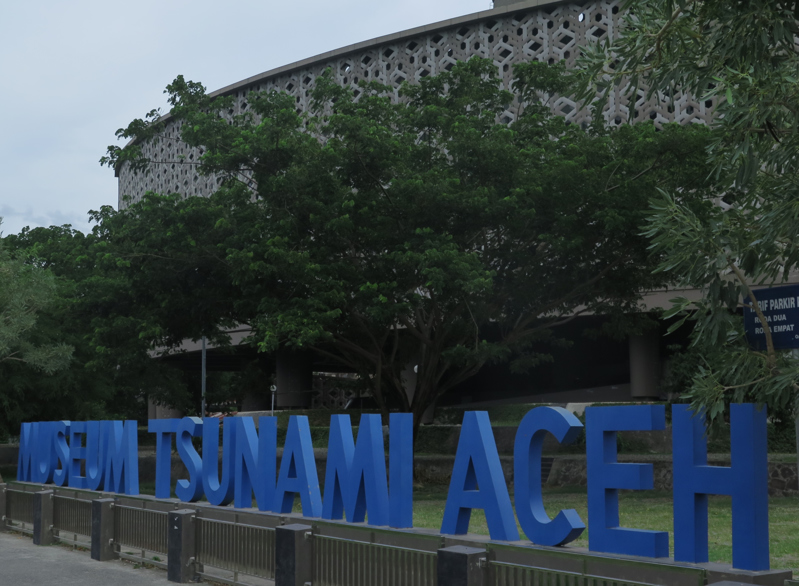
unmovable after the wave carried it far inland. In another spot surrounded by houses, 2 large fishing boats lie on their sides, a tethered cow grazing on the surrounding grass. One of the boats has a ladder to access the inside. The shiny deck slopes downwards at a dramatic angle. I grab the door so as not to slip. Inside, a small kitchen is complete with a sink still in place. The cabins below reached by lowering yourself down the hole, but they look dark and grimy. In the driving area, the controls are smashed. The front windows look out over the treetops. Another ship in the city sits balanced upon 2 decaying buildings now held up by an extra concrete pillar, left in memory of the horror. We pass a river filled with colourful large wooden fishing boats - a picturesque site. Our driver wants to continue driving us but we insist on returning to the guesthouse. We have no idea how much we will be expected to pay for this extensive excursion.
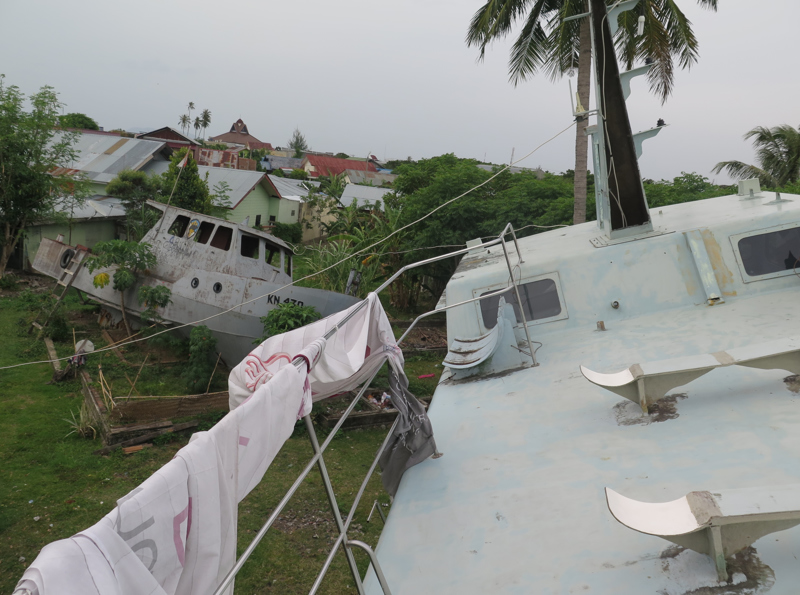
It's 6 o'clock and we haven't eaten since breakfast, but we must wait until 7 to eat outside the guesthouse. We sit with Putra, Fikri who runs the guesthouse and a guest who is on holiday from Jakarta - a nice man who speaks good English. As 7 strikes they thirstily drink their mugs of sugarcane for an instant energy intake. I try a sip but it is horrendously sweet. We eat fried chicken and Nasi Goreng, after which we are for some reason expected to pay for their meals too. Fikri rushes off before we have had time to negotiate the price for the day. Putra charges us an extortionate fee of 500,000 for the driving and petrol. I ask to speak to Fikri on the phone but am unable to lower the price below 400,000. We're upset and a little angry but we know that the fault lies with us for not agreeing a fee at the start. It includes transport to the bus terminal to catch the overnight bus to Medan and for the amount of driving, it is not an excessive fee.
The bus reclines, but our legs are a little too long to stretch out fully. It's decorated in Hello Kitty blankets and dirty fluffy pink cushions in the shape of Hello Kitty's head. I manage to sleep throughout the journey but Harry is not so fortunate.
Day 88 - 25th July 14
We are woken at 3.30 am for Ramadan breakfast so we share a plate of vegetables and chicken at the roadside warung. Despite not being hungry we're unsure when we will have a chance to eat again. When we arrive in Medan we take a metre taxi to the bus station. It's a busy, unattractive city, the roads crammed with traffic.
1.
Arrival in Jakarta, Pangandaran, Jogjakarta, Malang
2.
Volcanoes - Mt Semeru, Mt Bromo, Mt Ijen
3.
Ubud - a brief Sojourn
4.
Gilli Trawangan - white beaches and turquoise waters
5.
Boat Cruise - past the Komodo Dragons
6.
Flores - traditional villages and Mt Kelimutu
7.
Kuta, Lombok
8.
Baliem Valley - trekking in the mountains and meeting the Dani tribes
9.
Sentani - the festival and the lake
10.
Tana Toraja - Funerals and Burial Sites
11.
Kuala Lumpur - back in civilisation
12.
Cameron Highlands - trekking and tea plantations
13.
Georgetown, Penang - street art and crumbling mansions
14.
Banda Aceh and Pulau Weh - contending with Ramadan; Scuba Diving and snorkelling in paradise
15.
Lake Toba - the Batak people
16.
Bukit Lawang - Orangutans
17.
Unawatuna
18.
Volunteer Sri Lanka - Week 1
19.
Volunteer Sri Lanka Week 2
20.
Kandy and the East Coast
21.
Ella and Colombo
22.
Volunteer Sri Lanka - final week
23.
Earthbound Expedition - Kathmandu, Poon Hill and Chitwan National Park
24.
Back in Kathmandu
25.
Langtang - solo trekking
26.
Kathmandu to Varanasi
Share your travel adventures like this!
Create your own travel blog in one step
Share with friends and family to follow your journey
Easy set up, no technical knowledge needed and unlimited storage!
© 2025 Travel Diaries. All rights reserved.